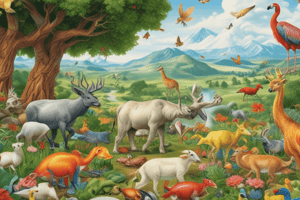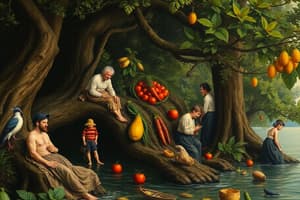Podcast
Questions and Answers
Which of the following animals are herbivores?
Which of the following animals are herbivores?
- Deer (correct)
- Zebra (correct)
- Eagle
- Tiger
Which of the following animals are carnivores?
Which of the following animals are carnivores?
- Bear
- Lion (correct)
- Crocodile (correct)
- Rabbit
Which of the following animals are omnivores?
Which of the following animals are omnivores?
- Snake
- Pig (correct)
- Giraffe
- Human being (correct)
Scavengers eat living plants.
Scavengers eat living plants.
What do we call organisms that break down decaying waste materials?
What do we call organisms that break down decaying waste materials?
Name one example of a scavenger.
Name one example of a scavenger.
Animals that get their food by hunting and eating the flesh of other animals are called __________.
Animals that get their food by hunting and eating the flesh of other animals are called __________.
Plants produce their own food through a process called __________.
Plants produce their own food through a process called __________.
Flashcards are hidden until you start studying
Study Notes
Food Habits of Living Beings
- Habitats include polar regions, deserts, grasslands, and oceans, providing essential resources for survival like food, water, and air.
- All living beings require energy, primarily sourced from the food they consume.
- Plants produce their own food through photosynthesis, while animals depend on other organisms for their sustenance.
Types of Animals Based on Diet
- Herbivores: Animals that exclusively consume plants. Key examples include:
- Deer
- Zebras
- Giraffes
- Elephants
- Rabbits
- Carnivores: Animals that hunt and consume the flesh of other animals. Notable examples are:
- Lions
- Tigers
- Crocodiles
- Foxes
- Wolves
- Eagles
- Omnivores: Animals that eat both plants and animals, such as:
- Bears
- Pigs
- Hens
- Mice
- Humans
Scavengers and Decomposers
-
Scavengers: Organisms that feed on the remains of dead animals. Examples include:
- Vultures
- Crows
- Hyenas
- Rats
- Ants
-
Scavengers differ from carnivores; for instance, a tiger actively hunts, while a vulture feeds only on carrion.
-
Decomposers: Organisms that break down dead matter and waste, recycling nutrients back into the soil. Examples include:
- Earthworms
- Fungi (e.g., mushrooms)
- Dung beetles
- Bacteria (microscopic organisms)
Importance of Scavengers and Decomposers
- Scavengers and decomposers play a crucial role in maintaining ecological balance by decomposing dead organisms and organic waste, thereby enriching the soil and facilitating plant growth.
Studying That Suits You
Use AI to generate personalized quizzes and flashcards to suit your learning preferences.



